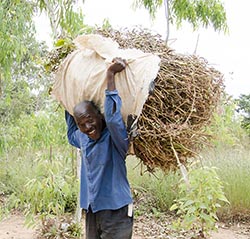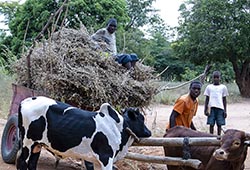Almost all crop types in Malawi suffered in what is seen as one of the worst crop performances of the last 13 years. Aftermaths of El Niño have left a good part of Malawian farmers more destitute, impoverished and worried. Despite the hard times in this planting season, those farmers who planted legume crops have some refuge and have stories to share.
Due to seasonal fluctuations in weather conditions, harvest in the 2015-2016 season slumped, thereby causing hunger to over 8,8 million people in Malawi. The state of affairs sends signs of dismay to tobacco farming. “After years and years of tobacco farming, the change to my life is not worthy pointing at. I have roofed my house with iron sheet, just after selling my soyabean in my three years of soyabean farming. Tobacco farming was too involving and required a lot of money to sustain it”, explained Mr Harrison Kazembe, a farmer from Linthipe (EPA) in Dedza.
There has been a wide perception among farmers that soyabean requires no fertilizer. Of late, scientists have confirmed the introduction of inoculant to crops, particularly legumes, to boost and increase yield. Mr Kazembe is one of the farmers that is using inoculant in his soyabean field. He mentioned the use of soyabean inoculant as one of his secrets to the good soyabean harvest for his farm. Inoculant is cheap and affordable for smallholder farmers and it significantly increases the yield of legumes, such as soyabean.
Legumes have been identified as potential crops, that would best be an option to tobacco farmers. Particularly, since tobacco farmers currently face a lot of international market challenges. The newly introduced soyabean technologies can best be used to revamp the Malawi economy, which heavily relies on agriculture. The government has been asking farmers to embrace new farming technologies, such as proper site selection, recommended ridge and seed spacing, use of certified seed (early maturing, drought tolerant, amongst others), timely planting, use of inoculant and manure, proper seed rate, timely control of weeds, pests and diseases and post-harvest management.
Agricultural scientists argue that new and advanced farming technologies would propel and ensure sustained food security and household development for smallholder farmers. Since changing weather patterns are leaving a huge negative impact on the soil, they argue that advanced management practices, such as intercropping of maize and legumes, are needed. Intercropped maize would benefit from legumes, as the latter have the ability to return nitrogen to the soil, thereby increasing soil fertility.
The life of farmers like Mr Kazembe has positively changed, since accepting new legume technologies brought by different organizations that are helping farmers to understand these technologies. The increased number of people farming legume crops in the Linthipe area and around the country confirm the positive impact of legume cultivation. N2Africa started its work in Malawi in 2010 and has so far reached over 30,000 farmers in the districts of Kasungu, Mchinji, Dowa, Dedza, Salima, Lilongwe and Ntcheu. The project is supporting farmers with legume technologies and training them on how they can fix nitrogen and improve soil fertility.
Mr Kazembe stated: “The coming in of N2Africa in our area has enabled me to double my soyabean production by planting double rows on single ridge. They made me realize that I could increase my production by applying inoculant to my soyabean. I was told that the inoculant also helped to return fertility to the soil. This was evidenced when I planted maize in the soyabean field the following year, where my harvested increased.” Furthermore, Mr. Kazembe said that N2Africa also introduced a number of improved early maturing soyabean varieties with good potential yield, such as Tikolore, Makwacha and Nasoko.
According to Lloyd Phiphira, Malawi country coordinator Malawi, the project is impressed with the response it is getting from farmers they are working with. He stated: “N2Africa would like to achieve high crop and livestock productivity, improve human nutrition, farm income, as well as soil fertility. Because of the erratic rains and persistent droughts, I am convinced that legumes, such as improved varieties of soyabean, groundnut, bean, cowpea, should be adopted both as nitrogen fixing, nutrition and cash crop in Malawi.”
 |
Picture left. A farmer harvesting soyabean improved variety in Kasungu District. ©IITA-Malawi Picture right. Farmers like these have experienced high yield with the use of inoculants. ©IITA-Malawi |
 |
N2Africa is also building capacity of the local inoculant producing company Agro-Input Suppliers Limited (AISL) to ensure inoculant availability to farmers. Recently, it sent two technicians to Ibadan, Nigeria to learn more of how to produce high quality inoculants. Malawi imports inoculant from Kenya, Zimbabwe and other countries. However, AISL has started producing soyabean inoculants, Nitrofix, supported by the Department of Agriculture Research Services (DARS).
“N2Africa has run diagnostic and demonstration trials in different fields in Malawi to see the effectiveness of different types of inoculant on soyabean. The results are overwhelming. Depending on the type of variety planted, we have experienced higher yields up to 40% in soyabean where inoculant was applied,” explained Phiphira. There is however, a great concern on the availability of the inoculant to farmers in Malawi. Mr Phiphira said: “AISL with technical and financial support from IITA, DARS, MOST and GIZ is trending towards sustainable production and supply of quality Nitrofix inoculant through agro-dealers. From this year start, Bio Fix from Kenya is another brand of inoculant that will be imported on commercial basis,” said Phiphira. Apart from helping farmers with how to plant and take care of their soyabean, N2Africa also taught farmers how to preserve soil fertility through nitrogen fixation. To prevent soil degradation by monoculture, we promote the practice of intercropping with legumes, such as soyabean, common bean, cowpea and groundnut.
Emmanuel Mwale, ICT Officer at IITA-Malawi
